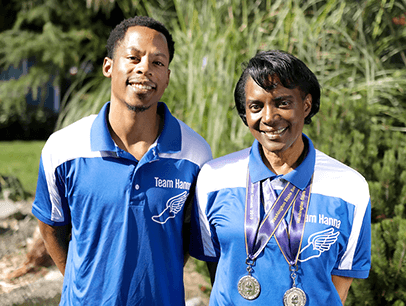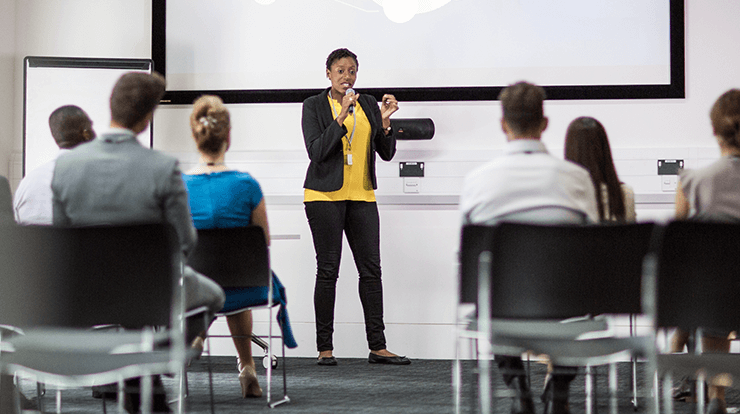I never intended to be a coach. Although I grew up being coached my entire childhood, the thought of being called a “coach” for my career sounded like a fancy name for someone who was unemployed.
As it turns out, I was wrong.
And I couldn’t be happier.
I grew up knowing coaches of the athletic type. I played at the Olympic development level as a fast-pitch softball player. From a young age, I understood the value of a good coach. I knew that to improve, I would have to put in the work, but I also knew there were coaches who were working with players at the highest level. Having a coach who knew the process and could guide me through it ensured my fastest way to success. If I was practicing the wrong things, it was going to get me nowhere quickly.
Fast-forward to when I started my company as a marketing strategist. One of my clients was a world-class videographer and was asked to give a TEDx Talk about a viral video he created. I had been a Toastmaster for over a decade and was a professional speaker myself at the time, so I figured I could help. I ended up coaching him through his TEDx Talk.
It was at that moment that I officially became a coach. What started out as something I did to help a client has now become one of the biggest income streams in my business.
And as I’ve gone down this path, it’s become clear to me that being a great coach is an art form. It’s not just about having the right knowledge and skills—it’s about knowing how to inspire and motivate, how to build trust and make a connection, and how to bring out the best in your clients.
 Writer Cathey Armillas, DTM, in a coaching session.
Writer Cathey Armillas, DTM, in a coaching session.Coaching is a craft that takes time, dedication, and a whole lot of heart. In some ways, we’re all coaches. In other ways, we’re all being coached. Any time we try to help others by giving advice or telling people about our experiences, we’re playing the role of “mini-coach.” Whenever we find ourselves in a situation where we are seeking advice or counsel, we are looking to be coached.
Working with a coach is like having a wise and supportive friend who helps you become a better version of yourself. It’s a journey that involves setting goals, gaining new perspectives, learning new skills, having a better process to evolve, and working toward your aspirations. With the help of a skilled coach, you can receive guidance, feedback, and encouragement to overcome obstacles, develop your skills, and achieve your desired outcomes.
Types of Coaches and Skills Needed
In the 1990s, coaching started steadily moving beyond sports and into the world of professional development. Today, people in all professions turn to coaches to help them achieve their personal and professional goals. In a world where we are constantly bombarded with information and faced with ever-changing challenges, coaching has become the ultimate life hack, offering guidance, support, and a shortcut to success.
The profession of coaching has been on the rise. From academic to creativity, from career to relationship, from financial to personal development—there is a coach for just about anything you strive to become better at. There are even general life coaches.
All the way to what I am: a speaker coach.
Being a coach requires a diverse skill set that encompasses both extensive knowledge and emotional intelligence. To be successful, you must have a polymathic mindset, capable of drawing on a wide range of expertise across multiple fields to tackle complex issues and provide effective solutions. And that’s not all.
Toastmasters can make excellent coaches because they are already regularly practicing one of the most important skills that a coach needs: listening.
To be a great coach (not just an okay one), you must also be good at psychology. You have to understand how people work, what motivates them, and how you can get them to change their behaviors.
With that being said, coaching is a remarkable profession that brings immense satisfaction. The ability to utilize acquired knowledge to help others and witness its impact firsthand is an unparalleled experience.
It’s also a good way to help people while enjoying a flexible schedule and earning good money.
Becoming a Coach
I always tell people that I didn’t become a coach, a coach I became. I never sought out coaching people in speaking, nor did I ever in a million years think that I could make a business out of it. But I did. And it’s possible.
If you have the desire to become a coach and start a business around it, the first place that I would start is in your sweet spot. What’s that thing that people always seem to be coming to you for? Where do you possess a perspective that other people might not have—what do they value and seek from you?

People sometimes ask if you need credentials to coach. The answer is maybe. Some types of coaching could require credentials or at least may be wise to have credentials for. There are many ways to go about getting credentials or certifications; it depends on what type of coach you want to become. The reality is that whatever you do you have to put in your time. You have to know your craft. Your clients are relying on you for your expertise, and you owe it to them to be the expert they need.
It makes sense that my client asked me to help him with his TEDx Talk; I was a Toastmaster and Toastmasters practice a lot of speaking (and evaluating). On that note, Toastmasters can make excellent coaches because they are already regularly practicing one of the most important skills that a coach needs: listening. And the best Toastmasters don’t just listen, they listen well.
In fact, something that makes Toastmasters particularly good coaches is that we’re taught to look for things that others often don’t see. For instance, many times the grammarian of a club meeting focuses on tallying the “um’s” and “ah’s,” tracking the word of the day, and occasionally offering mild grammar suggestions. However, there often isn’t an exploration of the “why.” And for coaches, the “why” is the most important question to ask. A good coach is someone who is able to point out specific instances where a speaker used filler words, enabling them to learn and modify their behavior.
Coaching Is More Than Advice
Toastmasters is where I learned the value of coaching. It’s also where I learned that the value of advice is the most important aspect of coaching.
Advice is just advice if there isn’t experience and knowledge behind it.
The difference between a mentor and a coach is that a mentor imparts advice from personal experiences, whereas a coach guides skill development using structured techniques and knowledge-based feedback. I’ve run into many people who call themselves coaches but are just glorified mentors.
My philosophy is that before you can teach or advise on a topic, you have to both practice and theorize. When you’re teaching or advising, you’re in “theory mode.” You’re telling your students, or clients, something you have a theory about based on what you’ve learned and experienced. But you get that experience when you’re in “practice mode.” If you never practice (and there are many ways to practice), your theories are based on what you believe to be true, not what you have witnessed to be true.
When I was working on my “How to Rock a TED Talk” coaching program, I decided I needed to spend more time in “practice mode.” I ended up watching over 1,000 TED Talks to study and carefully analyze. It took me over a year of watching multiple TED Talks and then nine months to write out the program to gain the experience I needed. That was in addition to all the speakers I coached. It’s never enough. You should always be on a path of continual learning.
Advice is just advice if there isn’t experience and knowledge behind it.
As a coach, you need to keep growing and expanding your knowledge so you can offer the best and most relevant advice to your clients. It’s a never-ending cycle of self-improvement, and that’s where the best coaches really shine. They come up with innovative tools, systems, and processes to help their clients move forward and achieve their goals faster.
To that end, I developed a tool called the Idea Map to help clients prepare for TED Talks. It’s a simple but extremely powerful tool that helps speakers organize their ideas and think through how to support their main message. When clients use it, they often feel like they’ve discovered a secret hack to creating a unique and powerful talk.
For example, not long ago, I worked with a client who is the executive director of a large state organization that focuses on land use in Oregon. He was giving a TEDx Talk about it, and people couldn’t believe how exciting he made such a seemingly boring topic. I have always believed that there’s no such thing as a boring topic, only boring speakers, and this was a great example of that. When he was asked how he did it, he immediately credited the Idea Map for helping him organize his thoughts and ideas.
As coaches, our role is to empower people to achieve things they never thought possible. That’s our job.
Ultimately, people seek out coaching because it offers a shortcut to success. If it lights a fire inside of you to help others find that shortcut and achieve great success, then coaching might be your calling. And if you genuinely enjoy diving deep into strategies, and creating tools and methods to help people unleash their fullest potential, chances are you’ll make an exceptional coach.
Cathey Armillas, DTM has been a Toastmaster for 20 years. She is a Past District Director and three-time DTM. She is also a world-renowned speaker coach who runs a successful business coaching CEOs, business leaders, and TED speakers on delivering talks and sharing their stories. Find out more at catheyarmillas.com.
Related Articles

Profile
Coaches Find Common Ground

Club Officers
Club Coach to the Rescue

Leadership



 Previous
Previous

 C O A C H
C O A C H
 Previous Article
Previous Article